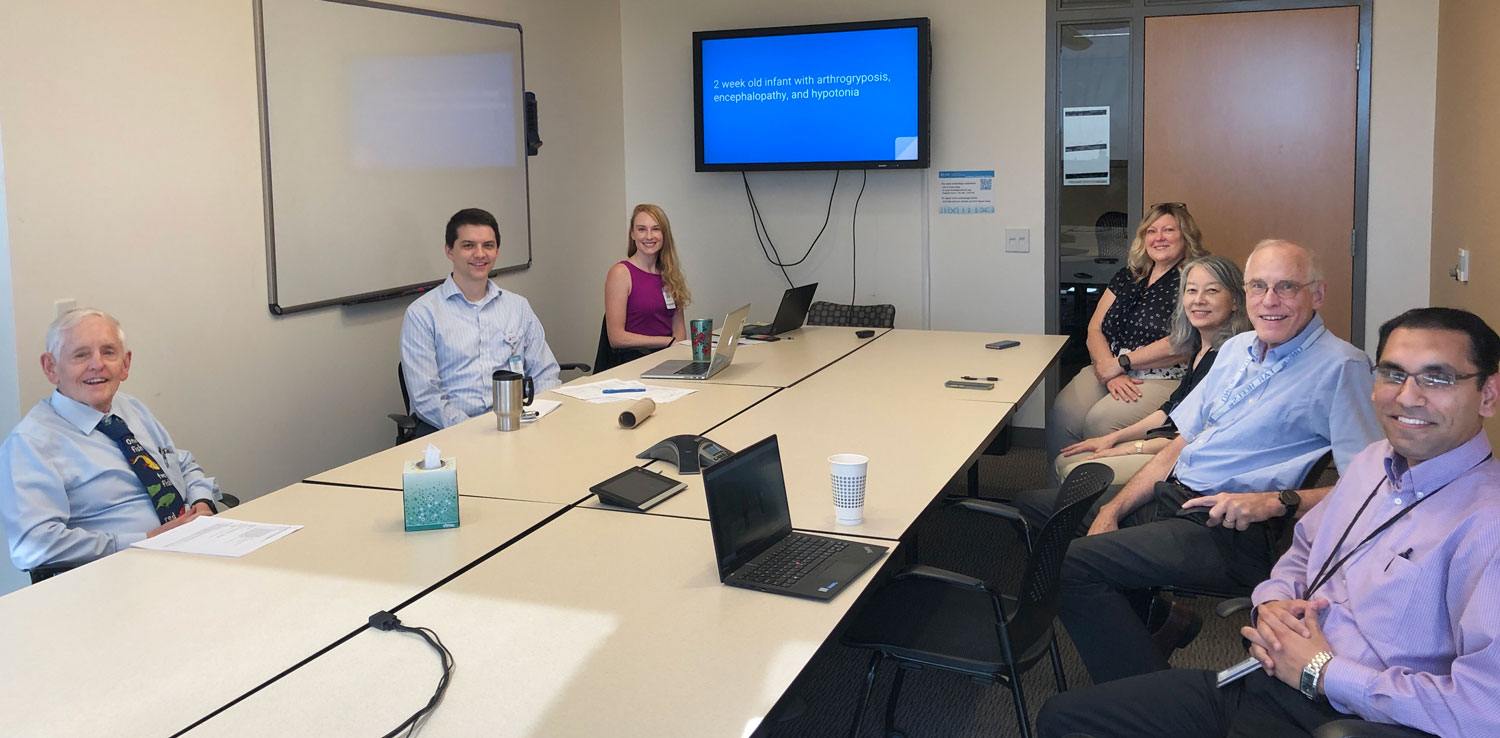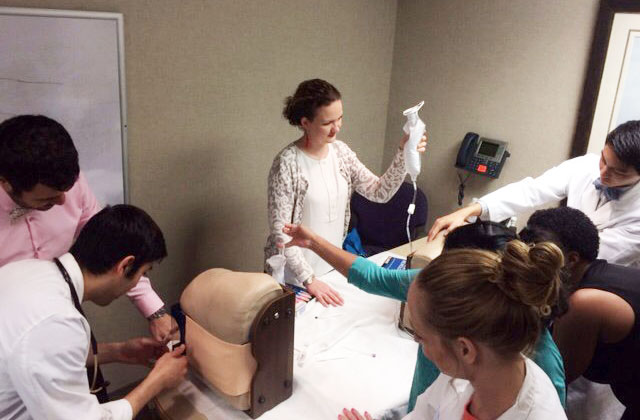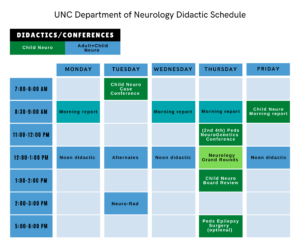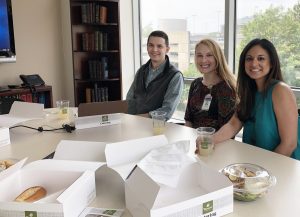Didactic Programs
Program Overview
 PGY-1 and PGY-2 pediatric residents participate in the educational opportunities offered by the Department of Pediatrics.
PGY-1 and PGY-2 pediatric residents participate in the educational opportunities offered by the Department of Pediatrics.
During the PGY-3 through PGY-5 years, child neurology residents participate in daily sessions alongside the adult neurology residents in an extensive didactic program offered through the Department of Neurology. Sessions specific to child neurology are also offered.
PGY-3 pediatric residents begin their transition to the Department of Neurology during a two-month, summer boot camp designed to introduce the basics of neurological care.
More information about each of these programs is provided below.

The Department of Neurology offers two months of boot camp for PGY-3 child neurology residents to help them transition into the department after two years as a pediatric resident. The boot camp is designed to introduce important principles of neurological care to newly minted PGY-3 child neurology residents and to help them transition into junior neurology resident status.
The boot camp lasts two summer months (July and August) and includes lectures, interactive clinical case sessions and hands-on labs. Each week is dedicated to a different aspect of neurological care: general neurology, stroke care, neurological intensive care and the challenges of initial night shifts in a hospital. The boot camp covers such topics as neurological exams in adult and pediatric populations, neurological emergencies, MOCK acute stroke exercises, LP simulator lab experience, common neurological consults and neuroimaging. The camp culminates with a Jeopardy event to celebrate the hard work and the steep learning curve of our junior residents.
Department of neurology didactics
The didactic program is constantly improved and updated to attune to the learning styles of our residents. We aim to achieve not only a stellar Board passing rate, but also to create excellent child neurologists with substantial knowledge of clinical neurology as well as all aspects of interdisciplinary patient care.
We see our residency training as a progressive curriculum, and we believe in layering the knowledge during every year of training starting with our boot camp series through the graduating senior grand round presentations. Our didactic program is a comprehensive schedule of rotating lectures, conferences, and seminars that build throughout the academic year. During July and August, the usual schedule for conferences is suspended to give space for our intensive and well-loved boot camp lecture series which covers such topics as adult and pediatric neurological exams, common neurological consults, and neurological emergencies.
During the months of September through June, the regular rotating lecture schedule resumes. Our didactic program includes: subspecialty lecture series, neuroradiology conference, clinical neurophysiology conference, pre-clinic conference, neurology grand rounds, weekly seminars, and an evening enrichment series.

Program Description
Subspecialty Noon Lectures are a series of lectures from each subspecialty division which encompasses a comprehensive overview of relevant topics in each area. The subspecialties include: Epilepsy, Vascular, Sleep Medicine, Child Neurology, Neurocritical Care, Multiple Sclerosis/Neuroimmunology, Movement Disorders and Cognitive Neurology.
Morning Report is a case conference led principally by the residents with guidance from the faculty. Morning Reports are held on Monday, Tuesday and Friday mornings. Each session starts with a RITE-style question: on Mondays, we review an image of the day; on Tuesdays, we ask a neuroanatomy question; and on Fridays, we offer a neurology potpourri. Following the question or image of the day, inpatient ward and consult teams discuss the most interesting one or two patients admitted/seen in consult from the past 24 hours. The team senior, (or on select months, the stroke fellow) then leads a brief discussion about the interesting teaching points of the case.
The Neuroradiology Conference is held with our colleagues from the Interventional Neuroradiology Division and Neuroradiology Division. At this conference, residents gain invaluable experience in reading and correlating neuroimaging studies with clinical presentation of their patients seen during inpatient services or outpatient clinics.
The Clinical Neurophysiology Conference is a series of lectures from the Neuromuscular and Epilepsy division. The conference covers basic clinical neurophysiology principles as well as interesting studies and cases from our CNP lab (EEG, EMG, nerve conduction studies, sleep studies, and more).
Pre-clinic Lectures are a series of lectures lead by the resident clinic preceptors. Topics focus on clinical aspects of outpatient care for patients with different neurological conditions as well as interdisciplinary care of neurological care and American Academy of Neurology practice parameters.
Neurology Grand Rounds includes the entire Department of Neurology. The topics range from basic science research to clinical trials to interesting case presentations. It is not uncommon for neurology residents to present at grand rounds once during their senior years.
Board Review Series lectures are led by chief residents and Adult Neurology Program Director, Dr. Nina Browner, and cover high-impact Board review topics as neuropharmacology, neuroanatomy, neuropathology, neurochemistry and neurophysiology.
Localization Seminars focus on case-based localization in clinic neurology. These sessions are led by Dr. Nina Browner.
The Evening Enrichment Series is an addition to our noon and morning lecture series at which time we will have M&M, professor rounds/interesting case conference or journal club. In addition to these well established and anticipated meetings commonly led by the residents, we will also offer professional development seminars, an innovation that we started during the 2015-2016 academic year. These seminars will be led mostly by the Adult Neurology Program Director, Dr. Nina Browner, and will focus on aspects of professional development such as creating a competitive academic CV, developing skills in writing for scientific publications and submitting to academic journals, choosing a career in academic neurology versus private practice, learning the art of giving feedback, recognizing the role of residents as a teachers, avoiding physician fatigue and burn out mitigation, and much more.
All teaching conferences are conducted in a state-of-the-art teleconference facility that allows for recording and videoconferencing broadcasts of all presentations. All conferences are broadcasted to our clinic for those residents who have rotations outside of the hospital (outpatient clinics, electives or post-call after night float). In addition, the lectures are recorded and posted to our residency SharePoint site. Each lecture includes related readings and PowerPoint slides offering a great resource for Board review. Resident participation is a major emphasis of all conferences, and as such, didactic time is protected for all residents.
 Child Neurology Case Conferences – weekly meetings, attended by students, residents on-service and faculty. The meeting is led by Faculty who present cases from the clinic and from the inpatient service, discuss related clinical topics, review relevant literature and present original research.
Child Neurology Case Conferences – weekly meetings, attended by students, residents on-service and faculty. The meeting is led by Faculty who present cases from the clinic and from the inpatient service, discuss related clinical topics, review relevant literature and present original research.- Child Neurology Board Review – weekly sessions dedicated to Board review and child neurology lectures by faculty from the division and other specialties.
- Child Neurology Morning Report – weekly ped neurology cases, discussion lead by residents, attended by all neurology inpatient teams.
- Neurogenetics Case Conferences – twice monthly multidisciplinary discussions of complex neurogenetic cases attended by child neurology faculty and residents, geneticists, genetic counselors and nurse practitioners.
- Pediatric Epilepsy Surgery Multidisciplinary meetings, residents are welcome to attend.
